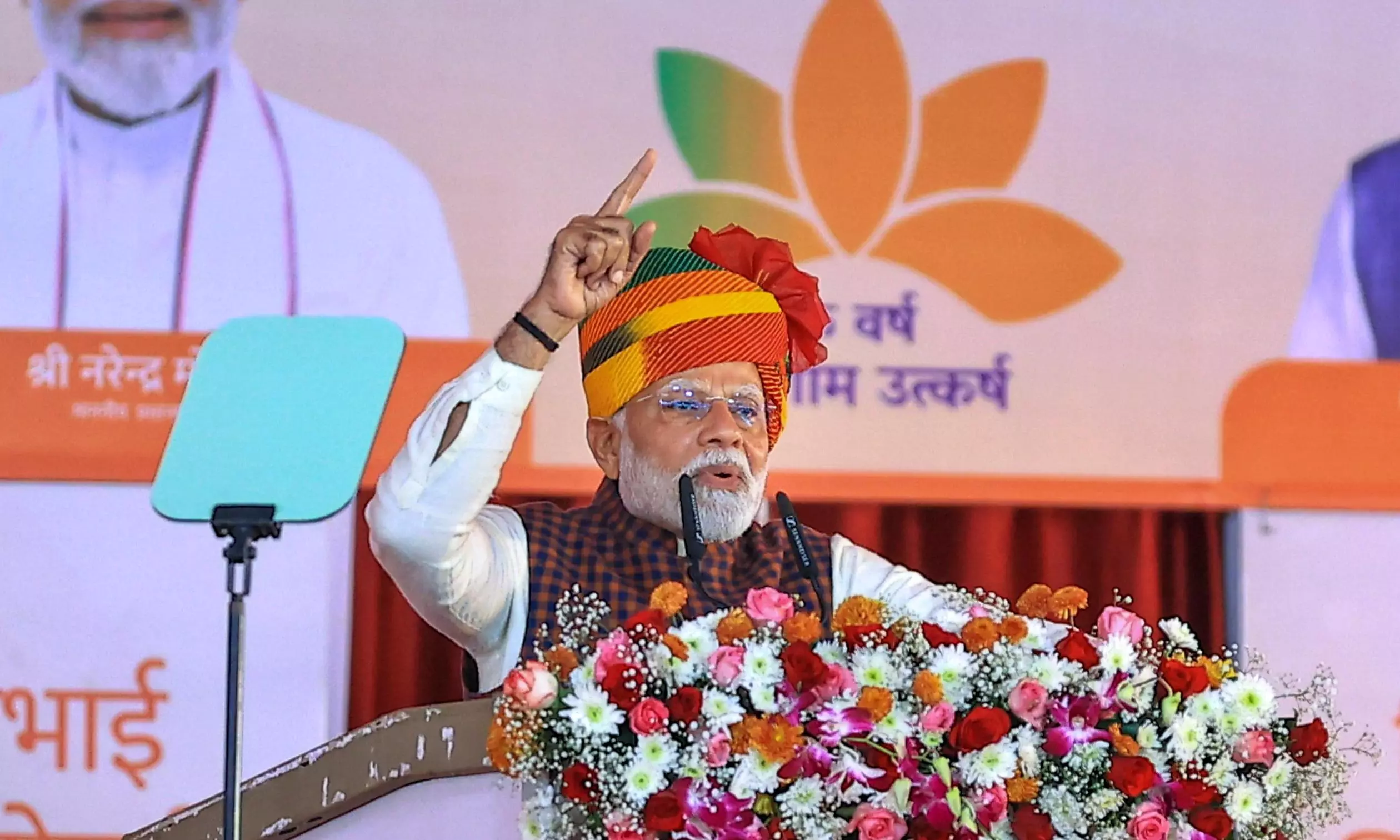
- Home
- India
- World
- Premium
- THE FEDERAL SPECIAL
- Analysis
- States
- Perspective
- Videos
- Sports
- Education
- Entertainment
- Elections
- Features
- Health
- Business
- Series
- In memoriam: Sheikh Mujibur Rahman
- Bishnoi's Men
- NEET TANGLE
- Economy Series
- Earth Day
- Kashmir’s Frozen Turbulence
- India@75
- The legend of Ramjanmabhoomi
- Liberalisation@30
- How to tame a dragon
- Celebrating biodiversity
- Farm Matters
- 50 days of solitude
- Bringing Migrants Home
- Budget 2020
- Jharkhand Votes
- The Federal Investigates
- The Federal Impact
- Vanishing Sand
- Gandhi @ 150
- Andhra Today
- Field report
- Operation Gulmarg
- Pandemic @1 Mn in India
- The Federal Year-End
- The Zero Year
- Science
- Brand studio
- Newsletter
- Elections 2024
- Events
- Home
- IndiaIndia
- World
- Analysis
- StatesStates
- PerspectivePerspective
- VideosVideos
- Sports
- Education
- Entertainment
- ElectionsElections
- Features
- Health
- BusinessBusiness
- Premium
- Loading...
Premium - Events

The Centre needs to start drawing plans to send similar teams to various nooks and corners of the country to emphasise people’s oneness and unity despite divergent religious identities
The Indian government’s decision to send out all-party delegations across the world to convey the message of social and political unity across parties and diverse communities and the continuing challenge from Pakistan-based (and supported) terrorist groups is welcome.
But, this will come to naught if the BJP leaders and functionaries continue plying Sangh Parivar’s divisive politics with the strategy of creating a societal schism based on religious identity, and it remains the party’s principal tool to maintain electoral hegemony.
Also read | In copycat move, Pak appoints diplomatic team to counter India's anti-terror delegation
This consistent commitment to majoritarianism shows no signs of being cast aside even when national unity across socio-religious communities is imperative.
Face-off over Tharoor
This only adds to the highly avoidable political wrangle between the BJP and Congress over the government’s inclusion of Shashi Tharoor as one of the seven members of Parliament named as leaders of the delegations to various countries.
These all-party visits have been planned as part of the move to mount a global campaign to convey and secure support for India’s position vis-à-vis the recent military exchange, continuing terrorism in Jammu and Kashmir and New Delhi’s declaration of responding similarly in the event of another terrorist strike on Indian territory and people in the future.
The wrangle between the BJP and the Congress over the inclusion of Tharoor by the government, despite the latter not nominating him as one of the four representatives of the party for these delegations, has the potential to take away the sheen from these visits.
The differing approaches merely draw attention to the pettiness of the two parties, especially the BJP which has clearly prioritised gaining an opportunity to politically embarrass its principal rival, over the necessity to display national unity in this hour of challenge.
Adding fuel to Cong fire
Its decision to put Tharoor at the head of the list is clearly aimed at fanning the simmering tensions within the Congress over the Thiruvananthapuram MP’s statement being seen by the party as ‘praising’ Modi, despite his clarification that the observations were made in personal capacity, after the media put the questions to him, and was not the official stance of his party.
The Congress has carried its grouse against Tharoor too far despite his clarification, even though it had nominated him last September as its nominee to be the Chairman of the Parliamentary Standing Committee on External Affairs.
The decision made it evident that the party considered him as possessing one of the most astute minds insofar as foreign affairs and diplomacy were concerned.
The objections, stated most ungraciously by Congress General Secretary Jairam Ramesh, also included a blanket assertion that loyalty to the party is paramount.
He also added, in a clear dig at Tharoor, that “there is a huge difference between being in Congress and being of Congress.” The allegation in this case is that Tharoor was merely ‘in’ Congress while people like Ramesh were ‘of’ the Congress.
Soft on divisive politics
But more important than these twin issues, within the Congress and the BJP’s attempt to snub its adversary, is the issue of the BJP’s refusal to come down heavily on party functionaries who make derogatory remarks based on religious identity.
Also read | Centre finalises 51 names for 7 anti-terror outreach teams, picks only one sent by Cong
Madhya Pradesh Cabinet Minister Kunwar Vijay Shah made unacceptable and impertinent remarks against Indian Army officer Colonel Sofiya Qureshi who was detailed for the crucial task of jointly briefing the media about Operation Sindoor against Pakistan.
Even at that time, it was pointed out, including by this writer, that selecting her for this job, essentially because she was a Muslim woman, while the other officer from the armed forces was also a woman, was mere superficial tokenism.
The refusal of the BJP to take action against Shah and instead accept his pathetic clarification, even as he seeks legal recourse to avoid the FIR which the MP High Court directed be filed against him, merely shows that the BJP has once again limited itself to rough and ready symbolism and would not go the extra mile to take action against party leaders who throw a spanner in the works of the nation presenting a united front.
Time for BJP to act tough
The decision of the party to allow the controversy over Shah’s remark to die a natural death stands in contrast to the MP High Court’s observation. The HC observed, “The statement made by Minister Vijay Shah prima facie has the propensity to cause disharmony and feelings of enmity or hatred or ill-will between the members of the Muslim faith and other persons who do not belong to the same religion.”
The task before the BJP now is unambiguous. It must necessarily ensure that the political credo which impels the likes of Shah to make offensive statements against Muslims and even Christians is jettisoned from its political belief systems.
The challenge to make this adjustment in its practiced philosophy is all the greater now due to the current ideological orientation of Pakistan’s Chief of the Army Staff, General Asim Munir.
It has to be borne in mind that Munir wears two uniforms – the army’s fatigues and the Islamist’s garb.
Pak army chief’s ideology
Munir is against the grain of all his predecessors barring General Zia-ul-Haq, who like him, was a committed army officer, an unabashed Islamist and a person who believed in the two-nation theory.
Importantly, Munir is also referred to as Hafiz-e-Quran or a person who has memorised the holy book. This however would have been acceptable if his religiosity remained restricted to his personal domain.
Also read | Tharoor on leading Operation Sindoor delegation: No politics, it's national service
Instead of this, he hit the headlines before the Pahalgam terrorist attack and India’s subsequent military conflict with Pakistan, with his speech on April 17 at the official function of Convention for Overseas Pakistanis in Islamabad.
This speech, importantly, was not delivered because of his knowledge of the Holy Quran, but because he is the COAS of the country. In that speech, Munir had not limited himself to compellingly propagating the two-nation theory but also casting it in a religious mould.
He likened Pakistan to the ‘second’ Medina, a modern-day Islamic State that mirrors the historical city when Prophet Mohammed established the first Islamic State.
Mirror image of Pakistan?
Munir being where he is now officially seated, is the de facto head of an Islamist nation in which the army, is the most powerful institution. Although the situation that Pakistan finds itself in now was witnessed previously in the late 1970s, when Zia-ul-Haq seized power, there are greater similarities with the backdrop after Partition.
The Pakistan State, rooted in Islamist values and politics, cannot be countered by a Hindu nationalistic framework, despite the obvious attraction for such a stratagem.
India’s success has always been based on not being a mirror image of Pakistan. Sadly, almost every turn in the nation’s destiny since 2014, has been in this direction.
Despite the tumultuous period of partition, India was able to unambiguously steal more than a march over Pakistan because it eschewed religious sectarianism and chose the secular path.
The Nehruvian template
Despite his acute antipathy towards Jawaharlal Nehru, Modi needs to borrow from the Nehruvian template of fostering unity in the diversity of the land and its people.
Despite the horrific nature of the Pahalgam attack, the people’s response within the Kashmir region in the wake of the terrorist strike was heartening.
But this was reciprocated by random attacks on Kashmiri Muslims in other parts of India, a trend which was sadly not out rightly condemned by either the prime minister or his minions.
In the days before India retaliated against Pakistan, RSS Sarsanghchalak Mohan Bhagwat relayed the message of the King’s dharma in the wake of attacks on ‘his people’ like in the wake of the Pahalgam attack.
Also read | In knots over Tharoor row, Congress slams Modi govt for ‘diversionary tactics’
But these calls cannot become routine and even if they do, the political leadership must stay away from religious dogma of all varieties.
Drawing lessons from India’s Hindu past, as done by Bhagwat, when relaying the message to Modi calling for striking at Pakistan, must be abjured.
Emphasising oneness
Much before the all-party delegations head to different countries of influence, the Centre needs to start drawing plans to send similar teams to various nooks and corners of the country to emphasise people’s oneness and unity despite divergent religious identities.
The initiative started by fielding Col Qureshi and Modi invoking the unity of the land in his speeches to the people of India on May 12 and again during his visit to the Adampur airbase the next day, cannot be put to a halt and instead must be continued on every occasion.
The moot question is whether after electorally thriving for the past quarter of a century based on divisive politics, Modi would have the courage to risk traversing another path, this one being inclusive in character.
(The Federal seeks to present views and opinions from all sides of the spectrum. The information, ideas or opinions in the articles are of the author and do not necessarily reflect the views of The Federal.)


